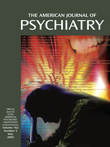The dinner was excellent: gently seared tuna and succulent crab cakes. The symposium was not as enjoyable, but still, this was a good start to my stay in Philadelphia. I had flown in that morning for the annual meeting of the American Psychiatric Association, my first experience at such a large conference. My room for the week was at a decidedly seedy motel in Bucks County, about an hour away from the city. I looked at my watch. There was still some time before the last train back, so I decided to spend some more time at this hotel, one of Philadelphia’s finest. I walked toward the bar, situated in the center of a high-ceilinged lobby with shimmering chandeliers. An ingenious waterfall with thin sheets of water cascaded onto pebbles, making a pleasant sound.
I settled into one corner of the bar and ordered a cocktail, soaking in the ambience. Most days, this was probably an oasis of jazz music and soft murmurs, but tonight it was teeming with other psychiatrists. Like me, they had bags with the conference logo displayed prominently and badges. Unlike me, most of them were in groups engaged in animated conversation. I entertained myself by listening in on some of the discussion.
“The schizophrenia update was excellent. It’s going to definitely change my practice.”
“I am not so sure about the applicability of that data in the real world.”
“What’s your experience with…”
Just then, a man walked into the lobby, carefully taking the few steps to the bar. He sat down on a sofa next to me, and I could smell him from where I was sitting: sweat, urine, and stale cigarettes. His shirt was wet even though it hadn’t been raining, and he rubbed his unshaven face and looked around at the crowd, torn jeans sagging below a corpulent belly. He began mumbling to himself, and although I briefly entertained the idea that he might be an eccentric colleague, a fellow psychiatrist who had forsaken formal attire in favor of something more unconventional, he looked so destitute and beaten that it was obvious he was one of the many mentally ill and homeless people I had seen in the city. Drugs, alcoholism, a major mental illness, social drift, and here he was, rummaging through the torn plastic bag he was carrying.
It struck me as incredibly ironic that this should happen, that someone who was mentally ill should walk into a roomful of psychiatrists. By now, the bar personnel were staring at the man and whispering among themselves. One of them finally went to the man.
“Do you need anything?”
The man shook his head and mumbled, “No.”
“This bar is for guests only, sir,” the waiter said.
The man ignored him and just looked away, saying something under his breath.
I found myself troubled by his presence, uncomfortable because I felt obliged to do something, and yet I held back, unsure of what I could do for the man. I wondered if my colleagues were similarly conflicted. They certainly seemed to have noticed him. I saw groups of other conference attendees pause and cast furtive but trained eyes on the man. The buzz of conversation around the bar slowed, and the soft strains of piano and the gentle splash of a waterfall could be heard again.
Then security guards appeared from either side of the lobby. With their suits and earpieces, they looked like they’d just taken time off from a presidential entourage. The man sank back into the sofa, but when they said, “Sir, you have to leave,” he collected his belongings and rose to his feet without a struggle.
I sat there, sipping my cold martini, and convinced myself that there was little that anyone could do. The options were limited; psychiatric practice itself was inadequate, making interventions in situations like these impossible. I mean, we could hardly administer medications or perform psychotherapy right there in the room. What were we supposed to do? Now, if a man with chest pain walked into a congregation of cardiologists, that would be another story. There would be a scramble of cardiologists rushing to help the man—to administer advice, to recommend hospitalization, or, if the need arose, to start cardiopulmonary resuscitation. How bizarre if instead of helping the man with chest pain, the cardiologists ignored him and continued to discuss the latest data in their field. Or worse still, what if they felt uncomfortable—even embarrassed—that a man with chest pain had stumbled into a cardiology meeting? What if they just did not know what to do?
The man stood and looked around, eyes drifting from one side of the room to the other, and it seemed that he was seeking help. But I continued to sip my drink, and like every other psychiatrist in the room, I avoided eye contact with the man. He shambled off, making his way through the lobby, and pushed the double glass doors and went out into the cool Philadelphia night.
The room seemed to lighten when he left. Glasses clinked, laughter and merriment drowned out the music once again, and conversations about the latest treatments of mental illnesses resumed in full earnest.

